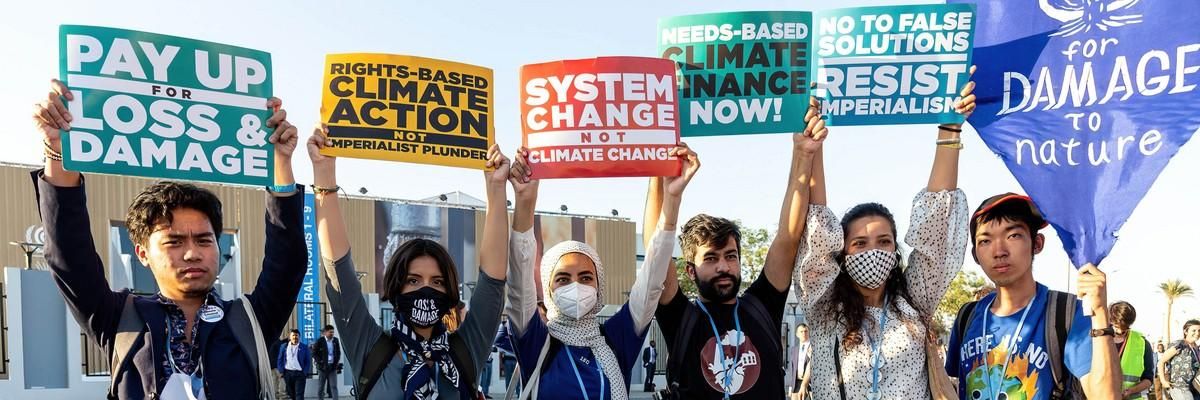Yuchen Li in Taipei | Yoshi Pak in Hong Kong
DW 11/21/2024
Dozens of leading pro-democracy figures have been handed long prison sentences as Beijing cracks down on civil liberties in Hong Kong.
Emotions ran high outside Hong Kong's High Court on Tuesday as 45 pro-democracy activists were sentenced for "subversion," in the largest trial to date under sweeping national security laws imposed on the territory by Beijing.
Some of the defendants' family members broke down in tears. "Why does my son have to go to prison? Tell me why. He is a good person," the mother of one of the defendants shouted as she was taken away by the police in front of the court.
The prison terms ranged from four years and two months to 10 years. Only two out of the 47 defendants were acquitted.
However, some of those outside the court remained relatively calm.
"Today is not an end, but just a beginning, or even a middle point [in history]," the girlfriend of defendant Ventus Lau, who faces more than four years in prison, told DW.
"Of course, even one day of imprisonment is too much, but we've had a long time to process and prepare mentally, so it's not very shocking," she said.
Dozens of leading pro-democracy figures have been handed long prison sentences as Beijing cracks down on civil liberties in Hong Kong.
Police held back media outside the West Kowloon Magistrates' Courts building where 45 activists were sentenced on Tuesday
Peter Parks/AFP/Getty Images
Emotions ran high outside Hong Kong's High Court on Tuesday as 45 pro-democracy activists were sentenced for "subversion," in the largest trial to date under sweeping national security laws imposed on the territory by Beijing.
Some of the defendants' family members broke down in tears. "Why does my son have to go to prison? Tell me why. He is a good person," the mother of one of the defendants shouted as she was taken away by the police in front of the court.
The prison terms ranged from four years and two months to 10 years. Only two out of the 47 defendants were acquitted.
However, some of those outside the court remained relatively calm.
"Today is not an end, but just a beginning, or even a middle point [in history]," the girlfriend of defendant Ventus Lau, who faces more than four years in prison, told DW.
"Of course, even one day of imprisonment is too much, but we've had a long time to process and prepare mentally, so it's not very shocking," she said.
"When the verdict was announced today, I was very calm and peaceful, not surprised at all. Over the past three years and eight months, we've considered many possibilities, including the chance of a more severe sentence. So, when the sentence was revealed today, it was within our expectations," she added.
How did Hong Kong get here?
Beijing tightened its grip on Hong Kong following massive pro-democracy protests in 2019. Up until then, the territory had enjoyed a level of legal autonomy and civil liberties under Hong Kong's Basic Law, a constitutional document included with the handover of the former British colony to China in 1997.
These included the right to assembly, free speech and a free press. But as China began to encroach further into Hong Kong's political and legal system, pro-democracy groups in July 2020 organized an unofficial primary election for the Hong Kong legislative council.
Its aim was to secure a majority of pro-democracy candidates in the council to block measures and pressure the pro-Beijing government. Over 600,000 Hong Kong residents participated.
However, city officials loyal to Beijing said the primary was part of a plan to "paralyze" the government and weaken the national security law, which at the time had just taken effect.
The organizers of the primary said they were well within their rights to organize an election under Hong Kong's Basic Law. The judges disagreed, and 47 people connected with the primary were charged with subversion in 2021.

Joshua Wong is one of Hong Kong's most famous pro-democracy figuresImage: Kin Cheung/dpa/picture alliance
Leading pro-democracy figures sent to prison
Tuesday's verdict represented a major blow to the protection of democratic principles under Hong Kong's Basic Law. Prior to the ruling, many of the defendants had already spent years in pre-trial detention, sparking concerns about judicial independence and due process.
The sedition trial has also sent many leading pro-democracy figures behind bars.
Among them is legal scholar Benny Tai, considered a central figure in organizing the 2020 primary. He was sentenced to 10 years in prison, the longest sentence handed down on Tuesday.
Joshua Wong, one of the pro-democracy movement's most famous and vociferous figures, was already in prison on other charges related to protests when he was charged with subversion. He received a sentence of four years and eight months.
Before leaving the dock in court, he shouted, "I love Hong Kong. Bye bye."
On Wednesday, Jimmy Lai, the founder of the shuttered pro-democracy newspaper Apple Daily, testified for the first time during his own, separate, trial under the national security law.
Leading pro-democracy figures sent to prison
Tuesday's verdict represented a major blow to the protection of democratic principles under Hong Kong's Basic Law. Prior to the ruling, many of the defendants had already spent years in pre-trial detention, sparking concerns about judicial independence and due process.
The sedition trial has also sent many leading pro-democracy figures behind bars.
Among them is legal scholar Benny Tai, considered a central figure in organizing the 2020 primary. He was sentenced to 10 years in prison, the longest sentence handed down on Tuesday.
Joshua Wong, one of the pro-democracy movement's most famous and vociferous figures, was already in prison on other charges related to protests when he was charged with subversion. He received a sentence of four years and eight months.
Before leaving the dock in court, he shouted, "I love Hong Kong. Bye bye."
On Wednesday, Jimmy Lai, the founder of the shuttered pro-democracy newspaper Apple Daily, testified for the first time during his own, separate, trial under the national security law.

Jimmy Lai has denied employing people who advocated for Hong Kong's independence at his former newspaperImage: Anthony Wallace/AFP
Lai has pleaded not guilty to two charges of conspiracy to collude with foreign forces and a charge of conspiracy to publish seditious material. He said he "never" used his contacts with foreign politicians to influence policy in Hong Kong.
"The core values of Apple Daily are actually the core values of the people of Hong Kong," Lai said, adding that these include "rule of law, freedom, pursuit of democracy, freedom of speech, freedom of religion, freedom of assembly."
Lai told the court he opposed violence and was not an advocate of Hong Kong independence, calling it "too crazy to think about."
"The more you are in the know, the more you are free," Lai said.
In a statement, Human Rights Watch associate China director Maya Wang said the sentences were "cruel," and show "just how fast Hong Kong's civil liberties and the rule of law have nosedived in the four years" since the draconian national security law took effect.
Lai has pleaded not guilty to two charges of conspiracy to collude with foreign forces and a charge of conspiracy to publish seditious material. He said he "never" used his contacts with foreign politicians to influence policy in Hong Kong.
"The core values of Apple Daily are actually the core values of the people of Hong Kong," Lai said, adding that these include "rule of law, freedom, pursuit of democracy, freedom of speech, freedom of religion, freedom of assembly."
Lai told the court he opposed violence and was not an advocate of Hong Kong independence, calling it "too crazy to think about."
"The more you are in the know, the more you are free," Lai said.
In a statement, Human Rights Watch associate China director Maya Wang said the sentences were "cruel," and show "just how fast Hong Kong's civil liberties and the rule of law have nosedived in the four years" since the draconian national security law took effect.
'Anything is possible'
A friend of Wong told DW outside the court that at least the sentence means "we know when we'll see our friends come out."
"Prison does not separate us from our human instincts," he said.
"Whether inside [prison] or not, don't let the state of the times affect us so much that we feel depressed and incapable of doing anything," he added.
Ventus Lau's girlfriend said the future of the pro-democracy movement in Hong Kong is not set in stone.
"I wouldn't say today is an end and then make a conclusion, because you don't know what will happen next. Anything is possible," she said.
Edited by: Wesley Rahn





 L
L














